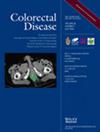A multicentre prospective single-arm clinical trial to evaluate the treatment outcomes of prophylactic laparoscopic lateral pelvic lymph node dissection for advanced lower rectal cancer
Abstract
Aim
There has been no prospective multicentre validation of the treatment outcomes of minimally invasive lateral pelvic lymph node dissection for lower rectal cancer; hence, this prospective study aimed to evaluate the treatment outcomes of prophylactic laparoscopic lateral pelvic lymph node dissection.
Method
Between May 2018 and August 2021, 90 patients with Stage II–III rectal cancer were registered. The clearance range for lateral pelvic lymph node dissection included the lymph nodes around the internal iliac artery and the obturator lymph nodes, while the autonomic nerves were generally preserved. The primary outcome was the incidence of Grade III–IV postoperative complications at discharge. The secondary outcomes were surgical and pathological outcomes, urinary function, sexual function, disease-free survival and overall survival. The experience of each facility and surgeon requirements were set to maintain quality control of lateral pelvic lymph node dissection.
Results
Of the 90 patients, 87 were analysed after exclusion of ineligible patients. There were 30 and 57 cases, respectively, of Stage II and III rectal cancer, among which 17 patients underwent neoadjuvant chemotherapy. The median operating time and blood loss were 472 min and 55 mL, respectively. Postoperative complications were observed in 22 patients (25.3%), and the primary outcome of Grade III postoperative complication was observed in five patients (5.7%). Eight lateral lymph nodes were harvested bilaterally, and lateral lymph node metastasis was observed in 14 patients.
Conclusion
Prophylactic lateral pelvic lymph node dissection can be safely performed with adequately quality-controlled laparoscopic procedures.


 求助内容:
求助内容: 应助结果提醒方式:
应助结果提醒方式:


